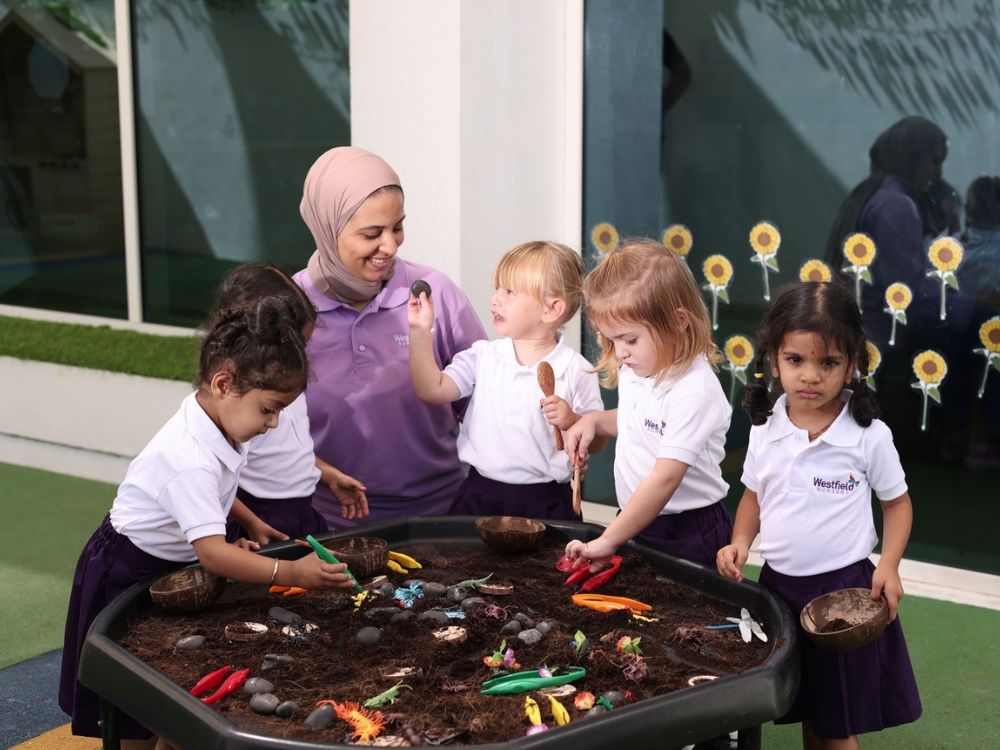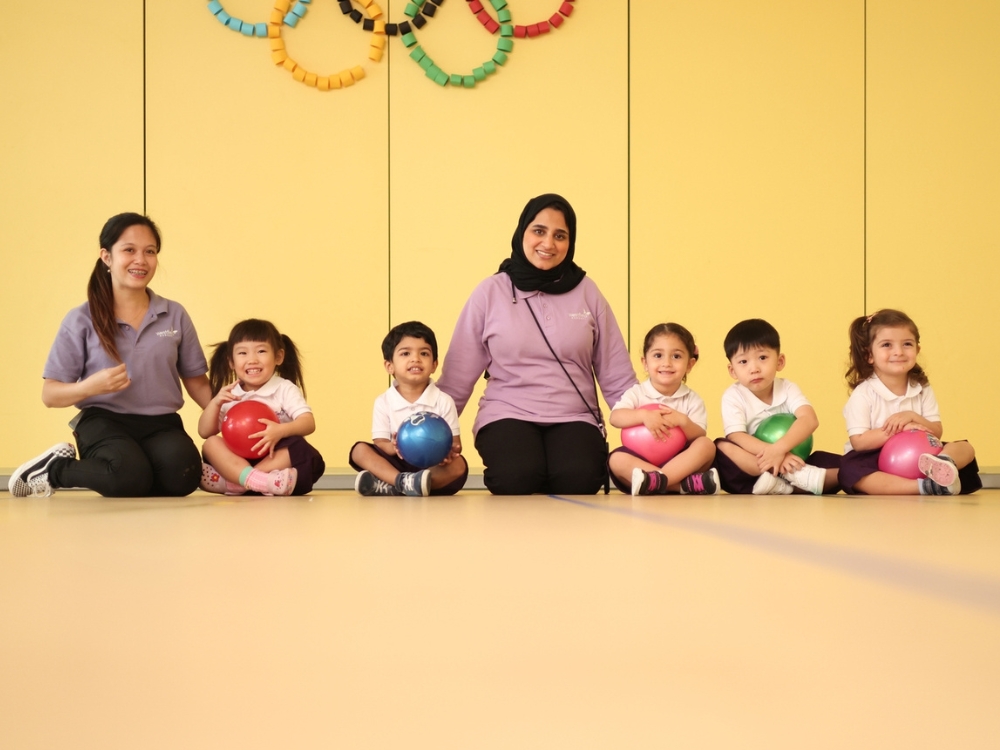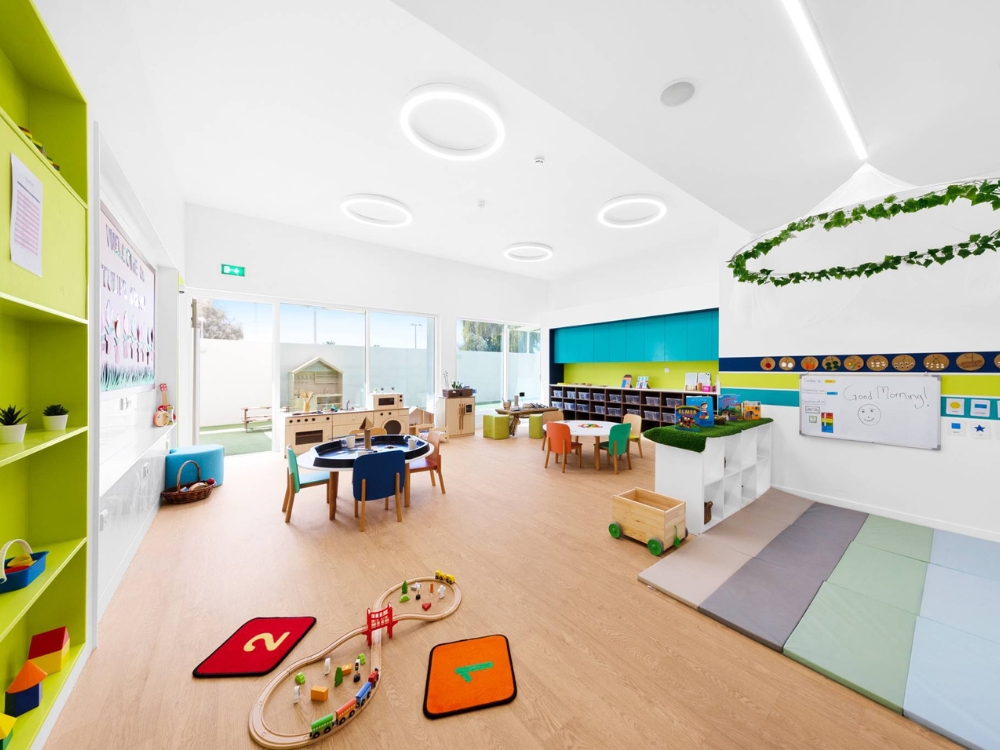Understanding the Statutory Framework for the Early Years Foundation Stage (EYFS)
 Exploring the Foundation Stage in education is crucial for understanding early childhood development. The Foundation Stage sets the stage for children aged 3 to 5 to thrive academically and socially, focusing on early learning goals including emotional development, literacy, and mathematics. This pivotal phase focuses on key areas like communication, physical development, and personal, social, and emotional well-being. Understanding the principles and practices of this stage empowers educators and parents alike to support young learners effectively. By delving into the EYFS, one gains insights into fostering a solid educational groundwork for future success.
Exploring the Foundation Stage in education is crucial for understanding early childhood development. The Foundation Stage sets the stage for children aged 3 to 5 to thrive academically and socially, focusing on early learning goals including emotional development, literacy, and mathematics. This pivotal phase focuses on key areas like communication, physical development, and personal, social, and emotional well-being. Understanding the principles and practices of this stage empowers educators and parents alike to support young learners effectively. By delving into the EYFS, one gains insights into fostering a solid educational groundwork for future success.
Importance of the Statutory Framework
The Foundation Stage framework is crucial in the early years of education. It outlines the guidelines for supporting children’s learning and development. Compliance with these regulations ensures high-quality education delivery.
The Early Years Foundation Stage (EYFS) standards are designed to enhance educational experiences for young learners. By following this framework, educators can create a conducive environment that fosters growth and development. Adhering to these standards promotes consistency across different early years settings.
Educators must have a clear understanding of the statutory framework to provide effective support to children. This knowledge enables them to tailor teaching methods, activities, and assessments according to established guidelines. A solid grasp of these standards enhances the overall quality of early years education.
Implementing the Statutory Framework
 Following the EYFS guidelines requires careful planning and execution by educators. They need to align their teaching practices with specific learning goals outlined in the framework. By incorporating diverse activities and resources, teachers cater to individual learning needs effectively.
Following the EYFS guidelines requires careful planning and execution by educators. They need to align their teaching practices with specific learning goals outlined in the framework. By incorporating diverse activities and resources, teachers cater to individual learning needs effectively.
Adherence to the statutory framework involves regular monitoring and assessment of children’s progress. Educators use observations, assessments, and evaluations as tools for tracking developmental milestones against expected outcomes. Continuous review ensures that interventions are timely and appropriate.
Incorporating play-based learning strategies is fundamental in meeting the EYFS requirements effectively. Play allows children to explore, experiment, and develop essential skills in a natural setting while promoting creativity and social interaction. Integrating play into daily routines enriches educational experiences for young learners.
Benefits of Compliance with EYFS Standards
Compliance with EYFS regulations offers numerous benefits for both educators and children alike:
- Consistent Delivery: Following set guidelines ensures uniformity in educational practices.
- Holistic Development: The focus on various areas like communication, physical well-being, and literacy promotes comprehensive growth.
- Parental Involvement: Clear frameworks enable parents to understand their child’s progress better.
- Quality Assurance: Meeting statutory requirements upholds high standards within early years settings.
Exploring the Early Years Foundation Stage Overview
Key Components of the EYFS Framework
The Early Years Foundation Stage (EYFS) framework is a comprehensive guideline for children aged from birth to five years old. It encompasses seven crucial areas of learning and development, such as communication and language, physical development, and personal, social, and emotional development. Educators use this framework to plan activities that nurture these essential skills in young learners.
The EYFS focuses on providing a holistic approach to early childhood education by emphasising not only academic learning but also emotional well-being and physical health. By incorporating various aspects like communication skills, physical abilities, and social interactions into daily activities, educators can create a well-rounded curriculum that caters to all facets of a child’s growth.
Understanding the principles behind the EYFS allows educators to tailor their teaching methods according to each child’s unique needs. For instance, if a child struggles with communication skills but excels in physical activities, teachers can adapt lesson plans to incorporate more opportunities for improving communication while still fostering the child’s strengths in physical development.
Benefits of Implementing the EYFS Framework
- Structured Development: The EYFS provides clear guidelines on age-appropriate milestones and goals for children at different stages of their early years. This structured approach helps educators track progress effectively.
- Personalised Learning: By recognising each child’s individual needs through ongoing assessment and planning the next steps accordingly, teachers can offer personalised support that caters to every learner’s specific requirements.
- Comprehensive Assessment: The assessment methods outlined in the EYFS allow educators to gain insights into children’s progress across various areas of learning. This comprehensive evaluation ensures no aspect of a child’s development is overlooked.
Practical Application in Educational Settings
In educational settings following the EYFS, integrating the Early Years Foundation Stage principles is paramount for fostering an enriching learning environment for young children. Teachers utilise documents provided by the framework to create detailed plans tailored toward meeting early learning goals in the Foundation Stage.
Educators often organise play-based activities that align with the Foundation Stage objectives while offering ample opportunities for exploration and discovery among young learners. Through carefully planned experiences centred around key areas like literacy development or mathematical concepts within everyday contexts such as storytelling or counting games, children engage actively in their own learning journey.
Delving into Prime and Specific Areas of Learning in EYFS
Prime Areas
The prime areas of learning in the Early Years Foundation Stage (EYFS) are crucial for young children’s development. They encompass communication and language, physical development, and personal, social, and emotional development. These areas form the foundation upon which all other learning is built. Educators focus on these prime areas as they are fundamental to a child’s overall growth.
Educators emphasise fostering strong communication and language skills in young learners during the Foundation Stage. Through activities like storytelling, conversations, and role-playing, children develop their vocabulary and communication abilities. This lays a robust groundwork for future academic success.
Encouraging physical development is another key aspect of the prime areas in the EYFS. Activities such as outdoor play, dance sessions, or simple exercises help children enhance their gross motor skills while also promoting a healthy lifestyle from an early age.
Supporting personal, social, and emotional development is vital for nurturing well-rounded individuals. By engaging in group activities, sharing toys with peers, or expressing emotions through art or playdough creations, children learn important social skills like empathy, cooperation, and self-regulation.
Specific Areas
In addition to the prime areas of learning within the EYFS curriculum stand the equally significant specific areas: literacy; mathematics; understanding the world; expressive arts and design.
Literacy encompasses developing reading and writing skills from an early age through activities such as storytelling sessions or exploring books together.
Mathematics education focuses on introducing basic concepts like counting or recognising shapes to lay a strong numerical foundation.
Understanding the world involves activities that broaden children’s knowledge about their environment—such as discussing different cultures or exploring nature during outdoor walks.
Expressive arts and design encourage creativity through various mediums like painting projects or music exploration.
Planning Activities
Delving into both prime and specific areas enables educators to plan diverse activities that cater to each child’s holistic development needs effectively.
By incorporating storytelling sessions focusing on vocabulary building under the communication area, educators can simultaneously address literacy by introducing new words within stories read aloud.
Integrating physical games involving counting steps can bridge physical activity with maths concepts, promoting both physical fitness along basic numeracy skills among young learners.
Engaging students in group projects related to different countries’ traditions fosters an understanding of cultural diversity while stimulating creativity under expressive arts & design.
Decoding the EYFS Learning and Development Requirements
Understanding the Foundation Stage Curriculum
The EYFS sets out essential guidelines for early childhood education. It encompasses a wide array of learning areas crucial for children’s development. For instance, it focuses on language and literacy skills, physical development, personal well-being, and social interactions. Educators refer to these requirements to structure their teaching methods effectively.
EYFS learning and development requirements are designed to ensure that children progress steadily in various key areas during their early years’ education journey. By emphasising literacy, reading skills are honed from an early age through storytelling sessions or picture books. Physical activities promote healthy growth while fostering coordination and motor skills.
Incorporating these guidelines into daily lessons helps educators create a holistic educational experience that nurtures every aspect of a child’s growth. For example, teachers can weave mathematical concepts into everyday activities like counting toys during playtime or exploring shapes during arts and crafts sessions.
Tailoring Teaching Strategies to Individual Needs
Decoding the EYFS learning and development requirements involves understanding how each child learns best based on their unique strengths and weaknesses. Personalised approaches cater to varying abilities ensuring no child is left behind in their educational journey.
By focusing on personal development matters such as self-confidence-building exercises or encouraging independence in tasks like tidying up after playtime fosters a sense of responsibility in young learners. These strategies help build character traits that will benefit them throughout life.
Educators must adapt teaching techniques to address individual needs effectively; this might involve providing additional support for children struggling with certain concepts while offering more challenging tasks for those who excel.
Enhancing Communication Skills Through Creative Expression
Communication skills form a vital part of the EYFS as they underpin all aspects of learning and social interaction at this crucial developmental stage. Encouraging creative expression through art projects or role-playing scenarios aids in language acquisition while boosting confidence levels.
Engaging children in group activities where they need to communicate ideas effectively helps enhance both verbal and non-verbal communication skills simultaneously – an essential skill set that will serve them well beyond their early years.
Navigating Changes to the EYFS 2021
Understanding the Foundation Stage in Early Years Education
The Foundation Stage is a crucial period in the early years of education that sets the groundwork for children’s future learning and development. It encompasses children aged between birth and five years old, providing a vital foundation for their progress. Within this stage, educators follow specific frameworks like the EYFS (Early Years Foundation Stage) to ensure holistic learning experiences.
Educators play a pivotal role during the Foundation Stage by creating an environment that fosters growth across all developmental areas. By understanding and implementing the principles of continuous provision, adults can support children’s learning effectively through well-thought-out activities and resources available throughout each day.
Incorporating various aspects such as physical development, communication skills, literacy, numeracy, and personal social-emotional development within daily routines helps create a comprehensive learning experience during the Foundation Stage.
Guidance for Early Years Providers
To navigate these changes effectively within their educational settings, early years providers should prioritise staying informed about updated policies, guidelines, and best practices related to the new EYFS framework. Training sessions or workshops can be beneficial tools for educators looking to familiarise themselves with these alterations and understand how they impact their daily practices positively.
Collaboration among staff members is essential during this transitional phase as it ensures consistency in implementing new strategies across different classrooms or age groups within an educational setting. By sharing insights, knowledge, and experiences gained through training sessions or professional development, schools can collectively work towards optimising outcomes for all students during their Foundation Stage journey.
Embracing Characteristics of Effective Teaching and Learning in EYFS
Playing and Exploring
Playing and exploring are fundamental aspects of the Foundation Stage curriculum. Children learn through hands-on experiences, such as building with blocks or engaging in imaginative play. This approach fosters creativity and problem-solving skills. By incorporating activities like sand and water play, teachers can encourage exploration while developing children’s social skills.
Children benefit from active learning by being physically involved in tasks. Through activities like role-playing or outdoor games, they develop coordination, teamwork, and communication skills. Teachers can enhance active learning by organising group projects where children work together to achieve a common goal.
Creating and Thinking Critically
Encouraging creativity and critical thinking skills allows children to express themselves while developing analytical skills. Art projects, storytelling sessions, or science experiments are excellent ways to promote critical thinking among young learners. Teachers can guide students to ask questions, make connections between ideas, and explore different perspectives.
- Pros:
- Enhances creativity
- Develops problem-solving abilities
- Fosters independent thinking
Emphasising Learning through Play in EYFS Education
Importance of Learning Through Play
Learning through play is integral to the Foundation Stage education, supporting children’s overall development. Through play-based activities, young children can engage in exploration, problem-solving, and creativity. This approach contributes significantly to their cognitive, social, emotional, and physical growth.
Quality play experiences in the Foundation Stage foster various skills essential for a child’s holistic development. For instance, engaging in imaginative play helps enhance creativity, while collaborative games promote social skills among children. Hands-on activities support physical development, aiding in the refinement of motor skills.
Encouraging learning through play not only nurtures academic abilities but also addresses crucial aspects like emotional intelligence and self-regulation. By integrating playful elements into educational practices at an early age, educators lay a strong foundation for lifelong learning habits and positive socio-emotional growth.
Benefits of Play-Based Activities
- Pros:
- Promotes holistic development
- Enhances critical thinking and problem-solving skills
- Fosters creativity and imagination
- Engaging in diverse forms of play such as role-playing scenarios or building structures with blocks stimulates different areas of a child’s brain simultaneously.
- The interactive nature of playing with peers aids children in developing effective communication strategies while fostering teamwork skills that are invaluable later on in life.
Implementing Play-Based Learning Strategies
Educators can incorporate various techniques to emphasise learning through play effectively within the EYFS curriculum:
- Create designated spaces within classrooms for different types of play activities like sensory trays and role play areas.
- Integrate thematic units into lessons where children can explore topics through hands-on projects or group activities.
- Utilise open-ended materials such as art supplies or building blocks that encourage experimentation and creativity among students.
Understanding Safeguarding and Welfare Requirements in EYFS
Importance of Safeguarding and Welfare Requirements
Safeguarding and welfare requirements in the Foundation Stage are crucial for ensuring the safety, well-being, and protection of children in early years settings. These guidelines encompass various aspects such as staff qualifications, premises safety, health practices, hygiene standards, and child protection procedures. By adhering to these regulations, providers create a secure environment where children can flourish without compromising their safety or welfare.
Children’s development during the Foundation Stage is significantly influenced by the quality of care they receive. Implementing robust safeguarding measures guarantees that children are protected from harm while promoting their holistic growth. For instance, rigorous staff qualification criteria ensure that individuals responsible for caring for young children possess the necessary skills to support their learning and well-being effectively.
Maintaining high standards of health and hygiene within early years settings is paramount to prevent the spread of illnesses among young children. Adhering to strict cleanliness protocols not only safeguards the health of children but also instils good habits from an early age. Providers play a critical role in upholding these standards by implementing regular cleaning routines, promoting handwashing practices, and ensuring proper sanitation across all areas frequented by children.
Ensuring Comprehensive Child Protection Procedures
Child protection procedures form a fundamental aspect of safeguarding requirements within the EYFS. Establishing clear protocols for identifying signs of abuse or neglect ensures that any concerns regarding a child’s well-being are promptly addressed through appropriate channels. Training staff members on recognising potential indicators of harm equips them with the knowledge needed to act swiftly in safeguarding vulnerable children under their care.
Creating a culture where open communication regarding child protection issues is encouraged fosters transparency within early years settings. Children should feel empowered to voice any worries or discomfort they may experience without fear of repercussions. By nurturing an environment where dialogue around safeguarding concerns is normalised, providers cultivate trust between adults and young learners while reinforcing protective mechanisms against potential risks.
Implementing effective child protection policies goes beyond mere compliance; it reflects a commitment to prioritising every child’s welfare above all else. Regularly reviewing existing procedures based on updated guidelines ensures that best practices are upheld continuously within educational environments catering to young learners’ needs.
Upholding Provider Accountability
Providers bear significant responsibility in upholding safeguarding principles outlined within the EYFS regulations concerning welfare requirements at the Foundation Stage level. By demonstrating unwavering commitment towards ensuring comprehensive child protection measures alongside maintaining optimal levels of welfare provision like safe premises conditions, education providers establish themselves as reliable custodians entrusted with nurturing future generations.
Meeting Ofsted Legal Requirements for Early Years Education
Compliance with the EYFS Framework
Early years providers in Dubai must adhere to the legal requirements set by the KHDA, the regulatory body. For schools following the National Curriculum of England, this involves full compliance with the Early Years Foundation Stage (EYFS) framework, which outlines standards for learning and development. Providers must ensure that their curriculum meets the seven areas of learning.
To comply with the provision-related aspects of the EYFS framework, early years settings need to offer a safe and stimulating environment for children’s development. This includes providing appropriate resources, activities, and experiences that support children’s learning across different areas such as communication, physical development, and personal, social, and emotional development.
Maintaining high-quality provision is essential for meeting the KHDA legal requirements. It entails creating an enriching educational setting where children can thrive academically and emotionally. By offering varied learning opportunities tailored to individual needs within a safe environment, providers demonstrate their commitment to delivering quality education.
Staff Qualifications
Another crucial aspect of meeting the KHDA legal requirements is ensuring that staff members possess suitable qualifications and skills. Qualified staff play a vital role in supporting children’s learning and development effectively. Early years providers must have a team with relevant qualifications based on statutory requirements outlined in the EYFS guidelines.
- Pros:
- Well-qualified staff enhance educational experiences.
- Higher qualifications lead to better outcomes for children.
To meet these criteria effectively, early years settings should invest in continuous professional development opportunities for their employees. By enhancing their knowledge base through training programs or courses aligned with early childhood education principles, staff members can improve their practice and contribute positively to children’s growth.
Demonstrating Positive Outcomes
Demonstrating positive outcomes for children is key. Providers need to show evidence of how they support each child’s progress across various developmental areas specified within the EYFS framework. This includes tracking individual achievements through observations, assessments, and evaluations regularly conducted by trained professionals.
- Establish clear assessment procedures.
- Monitor progress consistently.
- Provide feedback on improvement areas promptly.
Summary
The exploration of the Early Years Foundation Stage (EYFS) has shed light on the essential framework and requirements governing early childhood education. Understanding the statutory guidelines, learning areas, teaching strategies, and welfare provisions is crucial for educators and caregivers to create a nurturing environment for young learners. Embracing play-based learning, effective teaching methods, and safeguarding practices are paramount in fostering holistic development during the Foundation Stage.
In conclusion, mastering the intricacies of the EYFS not only ensures compliance with educational standards but also paves the way for impactful early years education. By prioritising children’s well-being, individual growth, and overall progress in line with the EYFS principles, stakeholders can contribute significantly to shaping a solid educational foundation for future generations. Continuous learning and adaptation to evolving EYFS frameworks will enable practitioners to deliver high-quality early years education that sets the stage for lifelong learning and success.
Frequently Asked Questions
What is the Early Years Foundation Stage (EYFS)?
The EYFS sets standards for the learning, development, and care of children from birth to 5 years old. It aims to ensure every child is given the best possible start in life.
How does the EYFS framework support early childhood education?
The EYFS framework provides guidance on delivering high-quality early education that helps children develop key skills, knowledge, and understanding across different areas of learning.
What are the Prime and Specific Areas of Learning in the EYFS?
The Prime Areas include communication and language, physical development, and personal, social, and emotional development. The Specific Areas cover literacy, mathematics, understanding the world, and expressive arts & design.
How can teachers incorporate play-based learning in Early Years education?
Educators can integrate play into lessons by creating engaging activities that promote exploration, creativity, and problem-solving skills while aligning with specific learning objectives outlined in the EYFS curriculum.
Why is it important to understand safeguarding requirements in an Early Years setting?
Understanding safeguarding requirements ensures that children are protected from harm or neglect. It involves recognising signs of abuse or risks to a child’s safety while following legal obligations to report concerns appropriately.
Imagine your child’s eyes lighting up as they climb towering castles, craft magical stories, and discover endless joy at our sun-drenched nurseries. See the EYFS curriculum come alive firsthand! Book your tour today and unlock their boundless potential: https://www.atticuseducation.ae/nurseries/
[ratemypost]





